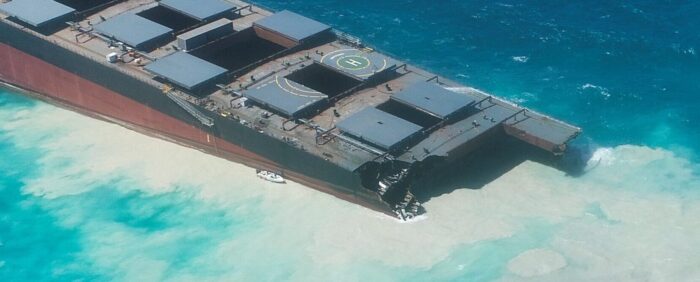Dustin Eno, COO, Navigate Response, explains how a better strategy could have lessened the damage of the MV Wakashio grounding.
A large vessel aground on a coral reef spilling oil into enticing turquoise waters is always a huge problem. But, in the case of the MV Wakashio, a better communications strategy could have lessened the damage done to the reputations of the companies involved and to our industry.
The MV Wakashio, an unladen bulker, ran aground in Mauritius early in the evening on 25 July 2020. Pictures started circulating quickly, but intense media coverage only started two weeks later when fuel oil started leaking from the vessel. Over the coming weeks the story remained high-profile with frequent spikes in coverage associated with developments ranging from dead dolphins washing up on the shore to the vessel breaking up.
As happens all too often in our industry, the media and communications response was insufficient at several steps.
- Communications should have started much sooner. By the time the charterer and the owner released statements on their websites (two weeks after the initial grounding), public perception and anger had already formed. Locals were widely quoted as saying they’d been abandoned by the company and government and had no choice but to take the clean-up into their own hands. The government, in partnership with the companies, should have taken a clear communications lead and proactively engaged with the community from day one.
- Better coordination of messaging was needed. It often appeared the parties were not working together. For example, at one point investigators reported that the vessel had sailed near land seeking Wi-Fi. However, local police directly contradicted this claim saying that they wouldn’t have needed to come so close to get a signal. On its own this inconsistency isn’t serious, but the failure to coordinate information and messaging eroded trust in those who were supposed to be responding to the situation. This is one of the reasons that the US uses a Joint Information Centre (JIC) and a lead public information officer (PIO) to focus the communications for major incidents.
- The tone of the communication should have matched the audience. Two key things were often missing. Firstly, empathy for those directly impacted expressed in a way that resonated. It should be noted that the owners apologised publicly, but the tone of the apology was more suited to a Japanese audience (where the owners are based) than to a Mauritian or global audience. Also missing were quotable key messages which would have helped ensure a share of the media coverage for those responding. Those who were leading the response and actually knew what was going on were quoted less than critics and local volunteers who reportedly cut off their hair to use as an absorbent in a desperate attempt to clean up the oil – which made a great headline.
- Accurate information and context should have been better distributed. Throughout the incident leading media outlets reported many of the simple facts incorrectly, including frequently referring to the vessel as a tanker. A tanker is scarier than an empty dry bulk vessel and this is just one of many facts that weren’t reported correctly. Some may see this as a sign of sloppy journalism (and that’s partly true), but it’s also a sign that no one was communicating effectively with the journalists and that’s the fault of the parties involved and of our industry at large.
- The company should have focused on how others were impacted (not themselves). On 11 August as 1,000 tons of oil were leaking into the sensitive marine environment, Reuters news agency quoted the charterer as saying, “it doubted whether the incident would have a large enough impact on its earnings to warrant issuing a disclosure.” I fully recognise that the charterer has an obligation to its investors, but this sort of statement has no place in crisis communications, even if, and perhaps especially if, it’s true – those who are suffering don’t want to hear that the company involved is unimpacted.
- The(limited) social media strategy should have matched the tone of the medium. Nas Daily, a Facebook influencer, posted a video focused on shipping. Full of sound bites, key messages and personality (all the things that the communications response to the incident were missing), the video was viewed millions of times. Nas Daily did not focus on the shipping companies, but rather on the flag state of Panama saying: “People chose Panama because it’s too easy” – implying that companies can get away with lax safety standards. To their credit, the Panama Ship Registry responded on social media, but unfortunately they fell into a common trap – they did not respond with empathy (only one paragraph half way through the statement expressed regret) and instead focused on denying the allegations made — “the shipping industry is not unsafe, ships…are not dangerous” Let’s not forget the quote attributed to 19th Century German chancellor Bismarck who said “never believe anything until it has been officially denied.” Within our industry we know that Panama is a well-respected flag, but sadly the tone of the response will not have helped portray this to Nas Daily’s audience. When attacked on social media, any response must not appear overly defensive (even if such is justified).
Communicating effectively for an environmental disaster is incredibly difficult. It depends on multiple groups working together and understanding the cultures and perspectives of the audiences that need to be reached. Yes, it’s easy for me to sit at my computer and criticize. That is not my aim. My aim is to say to everyone in our industry, we must all do a better job of communicating about our industry because, if we don’t, people will believe Nas Daily when he says: “Ships – they are more dangerous than we think”.
The views expressed in this article are solely those of the author and do not necessarily represent those of SAFETY4SEA and are for information sharing and discussion purposes only.
 About Dustin Eno, COO, Navigate Response
About Dustin Eno, COO, Navigate Response
Dustin has over 12 years of communications experience including as the head of crisis communications for the largest wildfire management centre in British Columbia, Canada. In this role he managed media and social media relations for destructive wildfires and property loss, routinely filling the Information Officer role in the incident command system.Dustin has a Bachelor of Arts and Sciences degree (BASc) specialising in audience engagement and political rhetoric and a master’s degree in communications (MSc) from the London School of Economics (LSE).
Dustin specialises in crisis reputation management and while at LSE developed computer models for tracking reputation in the online and print media. As Navigate Response’s Chief Operating Officer (COO) and Crisis Response Manager, Dustin manages the media response for numerous shipping incidents, coordinates the operations of our global network and is one of the company’s lead media trainers. In addition to his crisis communication experience, Dustin has a background in public relations and has held several positions on the boards of directors for charitable organisations. Dustin is also an award winning workshop presenter and public speaker.
































































